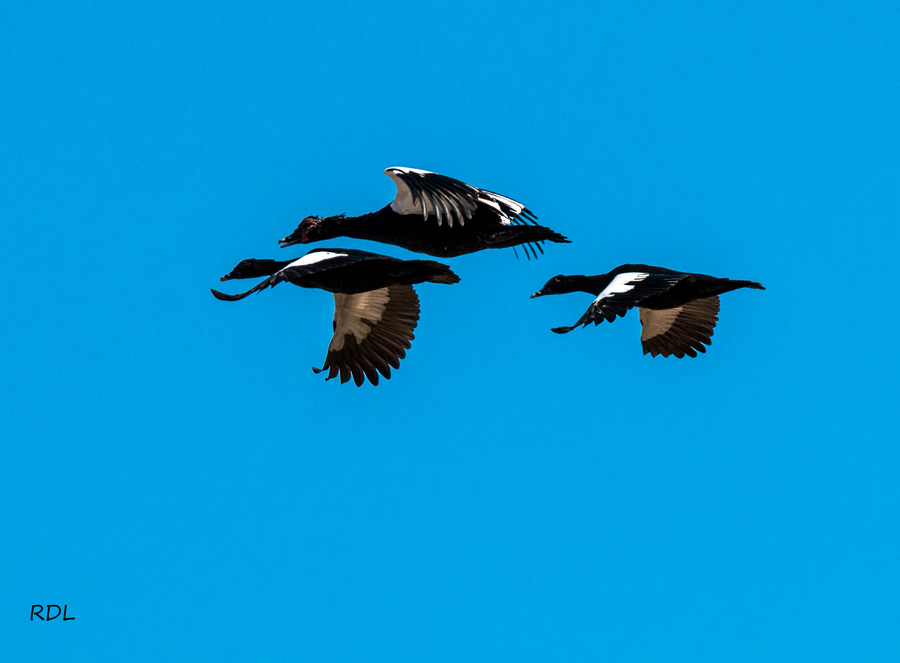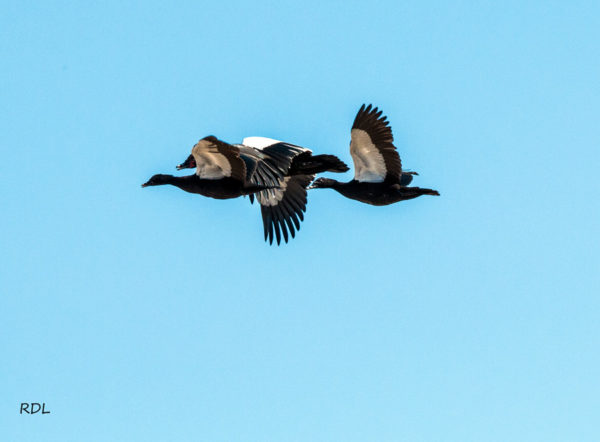Monte Mucho Audubon Society (MMAS) and the Río Grande International Study Center (RGISC) are asking ranchers in Zapata and Webb counties for access to ponds that may be home to the Muscovy Duck.
Prior to being photographed for the past two years at two ranches near San Ygnacio, the Muscovy was known to make its northernmost home in Mexico’s tropical rivers, ponds, and marshes.
Much sought by birders, the Muscovy, a large black duck with white markings, has been a sensation at sightings at the last two annual Laredo birding festivals co-sponsored by MMAS, RGISC, and the City of Laredo.
According to Daniel Perales, president of MMAS, “Our low impact visit to ranches will be simply to document if the Muscovies are nesting there.”
 Ranchers are invited to a May 10 workshop on the Muscovies at the Lamar Bruni Vergara Environmental Science Center on the LCC Campus. The workshop, which begins at 9 a.m. will feature habitat conservationists and Muscovy experts Jack Eitniear of Austin and Monterrey biologist Eduardo Carrera Gonzalez, will focus on establishing a management plan for Muscovy habitat on area ranches.
Ranchers are invited to a May 10 workshop on the Muscovies at the Lamar Bruni Vergara Environmental Science Center on the LCC Campus. The workshop, which begins at 9 a.m. will feature habitat conservationists and Muscovy experts Jack Eitniear of Austin and Monterrey biologist Eduardo Carrera Gonzalez, will focus on establishing a management plan for Muscovy habitat on area ranches.
Eitniear is the founder of the Center for the Study of Tropical Birds, Inc. (CSTB), a 501c3 devoted to bird conservation in the American tropics. He has written extensively on the ecological requirement of the White-collared Seedeater along the Río Grande near Zapata. He has conducted EARTHWATCH EXPEDITIONS to Mexico and is currently writing a book on the waterfowl of the New World Tropics.
Carrera, who joined Ducks Unlimited de Mexico (DUMAC) as a field biologist in 1984, has served as its national executive director and CEO since 1998. He facilitates collaboration with national and international organizations to develop wetland conservation and management projects, and to promote capacity building in Mexico.
“Zapata County is the best starting point for the first phase of our Muscovy project,” said Raul Delgado of MMAS. He added, “We would very much appreciate that birder-friendly ranchers allow us access to ranch ponds.”
He said that a Muscovy sighting was once and long ago documented in Laredo, but that the recent sighting of a pair five miles north of San Ygnacio and repeat sightings four miles northeast of San Ygnacio make Zapata County a natural choice for beginning research for a management plan for the Muscovies.
At the May 10 morning workshop, Eitniear and Carrera will begin their presentations at 9 a.m., break for lunch at noon, and then head out to visit ranches in Zapata County. They will also share specifications for building nesting boxes for the Muscovies.
The workshop is free and open to all area ranchers and duck aficionados.
Eitniear will bring a mated pair of Muscovies for residence at the Lamar Bruni Vergara Environmental Science Center.

Tom Miller of the Lamar Bruni Vergara Environmental Science Center (left) is pictured with Danny Perales and Raul Delgado of Monte Mucho Audubon Society as they work on completing nesting boxes for Muscovy Ducks. The boxes will be installed near ranch ponds where the Muscovies have been sighted. Muscovies have become must-see birds during the annual Laredo birding festival held in February. The large black and white ducks are the subject of a May 10 workshop at the Laredo Public Library.
“The Muscovy establishing a presence north of the border could have national implications for the ever-growing world of birding, which has replaced hunting as the number one source of revenue in the great outdoors. It will certainly be a draw for our annual birding festival, which in addition to taking birders to local sites, also takes them to ranches in both counties,” said Tricia Cortez, executive director of RGISC. “We will do all possible to help the Muscovy establish a home in Zapata and Webb counties. To that end, Monte Mucho Audubon, RGISC, and ranchers can work together to place nesting boxes at stock ponds,” she said.
Referencing the attached photos, Cortez asked, “What rancher wouldn’t want the magnificent beauty of the Muscovies at the ponds of his or her ranch?”
For further information, please call Daniel Perales at (956) 764-0531 or Tricia Cortez at (956) 718-1063.





